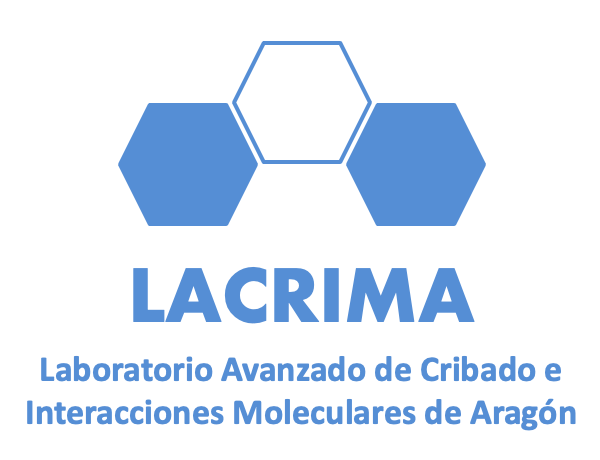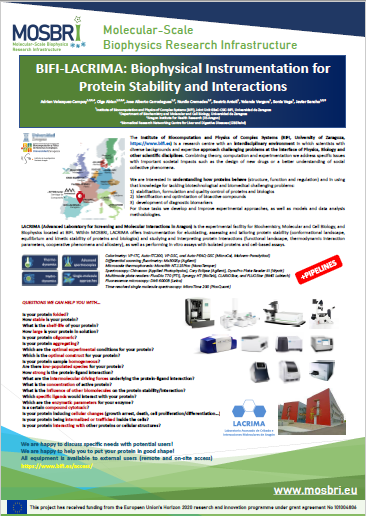13) BIFI-LACRIMA – Institute for Biocomputation and Physics of Complex Systems, University of Zaragoza
Location: Zaragoza, Spain
Web-site(s):
MOSBRI reference site for the following techniques:
DSC: Differential Scanning Calorimetry, ITC: Isothermal Titration Calorimetry, Time-resolved single particle fluorescence
Practical information:
User information



Partner description
BIFI-LACRIMA, located in the Institute of Biocomputation and Physics of Complex Systems (BIFI) at the University of Zaragoza (Spain), is a biophysics laboratory offering access to advanced instrumentation, computational resources, and expertise in biological calorimetry, protein stabilization, and protein ligand identification. Besides, LACRIMA offers advanced experimental infrastructure for protein expression and purification, as well as protein biophysical characterization from single molecule spectroscopy to fluorescence microscopy.
Instruments / methodologies offered through TNA
Protein Stability and Interactions: BIFI-LACRIMA offers equipment for elucidating and assessing protein stability (conformational landscape, equilibrium and kinetic stability of proteins an biologics) and interactions (functional landscape, thermodynamic interaction parameters, cooperative phenomena and allostery), from in vitro assays with isolated protein to cell-based assays:
- Calorimetry: VP-ITC, Auto-iTC200, VP-DSC, and Auto-PEAQ-DSC (MicroCal, Malvern-Panalytical)
- Surface plasmon resonance: Biacore T200 (GE Healthcare)
- Microscale thermophoresis: Monolith NT.115Pico (NanoTemper)
- Spectroscopy: Chirascan spectropolarimeter (Applied Photophysics), Cary Eclipse fluorimeter (Agilent), NanoStar Dynapro DLS y DynaPro Plate Reader III (Wyatt Technology)
- Multimode plate readers: FluoDia T70 (PTI), Synergy HT (BioTek), Mx3005p (Agilent), CLARIOStar and FLUOStar (BMG Labtech)
- Fluorescence microscopy: DMI 6000B (Leica)
- Single molecule spectroscopy: MicroTime 200 (PicoQuant)
Protein Stabilization and Drug Discovery: LACRIMA is a reference academic laboratory for drug discovery and protein stabilization by applying biophysical, biochemical and computational tools for identifying ligands capable of modulating the function of protein targets and for stabilizing protein targets according to different strategies:
- stabilization by sequence redesign
- stabilization for solvent composition optimization (formulation)
- stabilization by ligand binding
- target engagement assessment
- ligand cytotoxicity evaluation
Characterization and Quality control: In addition, basic protein characterization and quality control are available at this facility, e.g.:
- purity
- molecular mass
- molecular size
Access modality: Access is typically allocated for 4-5 days. Both physical and remote access is provided.
Sample requirements
Full details of the sample requirements for each of the techniques offered at this TNA site can be found here.

